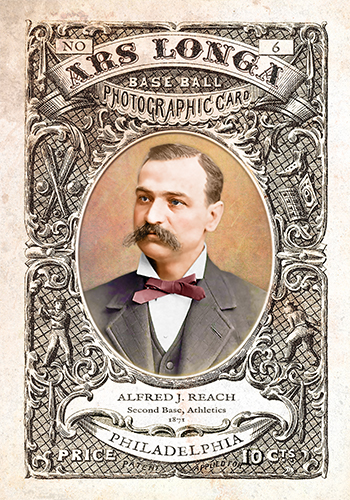
- Series: Mort's Reserve
- City: Philadelphia
- Team: Athletics (NAPBBP)
- League: National Association (NAPBBP)
Alfred James Reach (1840-1928) “served baseball with distinction as player, organizer, club owner and provider of the equipment to attain the highest possible skill in the game” per his own Reach’s Official Base Ball Guide upon his death. “A good man, of the kindest impulses, his name will last as long as we have baseball” expressed the legacy of one of the great men of the early era of America’s game. The London-born, Brooklyn-raised Reach joked that he made the gloves he eschewed in the beginnings of the game in which he starred for the Brooklyn Eckfords and Philadelphia Athletics. He also made the AL’s balls while owning the NL Phillies franchise. A genius for marketing equipment and a lifelong love of the game made him one of the most influential figures of baseball’s first half-century.
- Began play in the amateur era, then founded the NL’s Philadelphia club in 1883
- Built the first modern ballpark in ’87, then rebuilt it with steel after a fire in ‘94
- Al's brother Bob Reach was an MLB shortstop for 3 games, 1872-1873
- Was the 88th player to debut in MLB
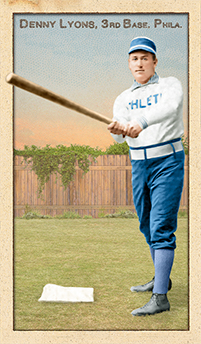
- Series: Beginnings: 1880's
- City: Philadelphia
- Team: Athletics (AA)
- League: American Association
Dennis Patrick Aloysius Lyons (1866-1929) was a strong hitting third-baseman over a thirteen year career in the major leagues from 1885 with Providence to 1897 with the Pirates. His lifetime batting average was .310. In 1890 he led the American Association in on-base percentage and slugging, and was second to Chicken Wolf in BA. He hit 62 home runs in the Deadball Era and was known as a formidable fielder in the no-glove era. Lyons’ era was also a time of rapid evolution in the game. In 1887, the year Denny “hit” safely in 52 straight, the pitcher’s box had been tightened and the pitcher’s delivery shortened to one step. Walks were also considered hits that year which has caused most modern students of the game to dismiss his “streak,” second only to Joltin’ Joe. But DiMaggio didn’t have to hit a fastball hurled from fifty feet. Only two of the 52 games was affected by walks but they were in the middle of the run. Despite such quibbles, Lyons was clearly a very accomplished player both offensively and afield.
- Consistently ranked among batting leaders in both leagues he starred in: AA and NL
- An Amos Rusie fastball broke two fingers and ended Denny’s ML tenure. He continued in the minors and hit .274 for the Beaumont Oil Gushers in 1903
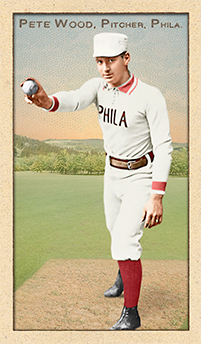
- Series: Beginnings: 1880's
- City: Philadelphia
- Team: Quakers
- League: National League
Peter Burke Wood (1867-1923) got into the majors with the Buffalo Bisons in 1885, just in time to join his brother Fred as an early family combo in the big leagues, and rarer still to be teammates. Fred retired after that season. Pete was a native of Ontario Canada and had begun ‘85 with two Hamilton teams just across the river from Buffalo. Wood would shuttle back and forth over Niagara playing for Buffalo’s International League entry in ‘86 and the Hamilton Clippers of the IL and the Hamilton Hams of the International Association through the 1888 season. He got one more call-up with the Philadelphia Quakers in 1889, but saw action in a mere three games where he failed to get a hit but did manage to drive in two runs. Pete returned to Canada for his final seasons with the London Tecumsehs and Toronto Canucks. Throughout his time in pro ball Wood had alternated between pitching and infield/outfield. He was 8-15 with Buffalo in ‘85 and had one stand-out season in the pitcher’s box with the Hams in ‘88, winning 37 and losing 12. He may have hurt his arm in that remarkable year as he rarely pitched again. Nevertheless, his performance undoubtedly gained him that final shot in the majors, but he was only able to win one of his two starts for the Quakers. His victory came against the Indianapolis Hoosiers where Philadelphia won 11-4 beating Charlie Getzien.
- MLB.com compiled a list: Brothers as teammates in MLB history. They found nearly 100 such duos (including some trios--looking at you Alou and Cruz brothers….) Although the compilation extends into the 19 century, the Wood brothers are absent
- Baseball Almanac has identified over 350 brother combinations to have made the majors. Perhaps the record goes to the Delahanty clan who put five siblings into the bigs
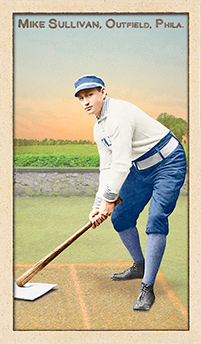
- Series: Beginnings: 1880's
- City: Philadelphia
- Team: Athletics (AA)
- League: American Association
Michael Joseph Sullivan (1860-1929) didn't play the hot corner as poorly as that ancient mariner (“he stoppeth one in three”), but let's just say that Mike made other third-basemen of his era look pretty good. Despite a respectable ability at the plate, it was defense that proved offensive to his management, leading to an abbreviated time in the major leagues. Mike lasted all of 28 games before Philadelphia sent him up to Syracuse where, four games later, his pro ball career was over. Sullivan had started out in New England playing for three teams in 1884: Meriden, Worcester and Lawrence. He stayed in the neighborhood in '85 and '87 (no record of his play in 1886). He was with Springfield and back to Meriden in '85 and Hartford in '87 before his call-up to the American Association's Athletics.
- Sullivan actually split his time between outfield and third. But it was in the infield he did his real damage. The Brooklyn Eagle eagerly recorded the game on May 13 when the hapless Sullivan played the goat, making three errors including the one that led to the Bridegrooms' victory over the Athletics
- Mike's debut that season had been at third where he made two errors subbing for Denny Lyons. He went on to make ten more miscues in his next nine games before being exiled to left field where his ability to track down the ball wasn't much improved. Despite having a slugging average that ranked behind only John Reilly and Harry Stovey among AA hitters with a minimum 100 at-bats, his bosses couldn't abide his .726 fielding percentage
- A native of Webster, Massachusetts, Mike was born on the eve of the first great national calamity, the Civil War, and died there just before the onset of the worst economic calamity, the Great Depression.
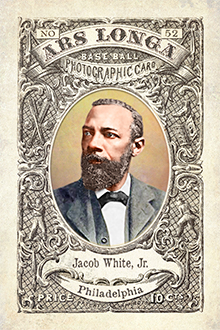
- Series: Pioneer Portraits I: 1850-1874
- City: Philadelphia
- Team: Pythian B.B.C.
- League: Independent
Jacob C. White Jr. (1837-1902) was the son of a preacher in Philadelphia who grew into one of the city's most prominent businessmen. With his friend Octavius Catto, Jake founded and helped lead the Pythians, one of the first and most successful black baseball clubs of its day in America. Catto was the fiery on-field presence that galvanized the Pythians into a force on the national scene as baseball and the country emerged from the darkness of Civil War. But he depended on his childhood pal to help fund the club and give it necessary administration. White had earlier demonstrated the gifts of organization and leadership Catto needed when he took over the Robert Vaux school in 1864, taking it from a damp church basement struggling to help a few dozen black kids to a noted institution whose legacy continues today. Thanks to White's intellectual bent, the Pythians were as unlike the typical white ball clubs of the time as possible. The Club shared quarters with the Banneker Institute, also founded by White. The Pythians were refined gentlemen representing the elite of black society in Philadelphia. They were as interested in scholarly debate, abolition, desegregation and civil rights as they were in playing ball. Catto and White tried to join the National Association of Base Ball Players and, despite the support of the Athletics, were rejected. Eventually, in 1869 the club did get one chance to play a white team, the Philadelphia City Items, and walloped them 27-17.
- White was the promoter of a distincive feature of black baseball in Philadelphia: an all-day celebration of sport and fellowship which invariably ended with a banquet organized by Jake
- When his best friend and partner Catto was assassinated in the lead-up to the 1870 elections, a grieving White stepped away from the game he loved but continued to serve his city for decades




